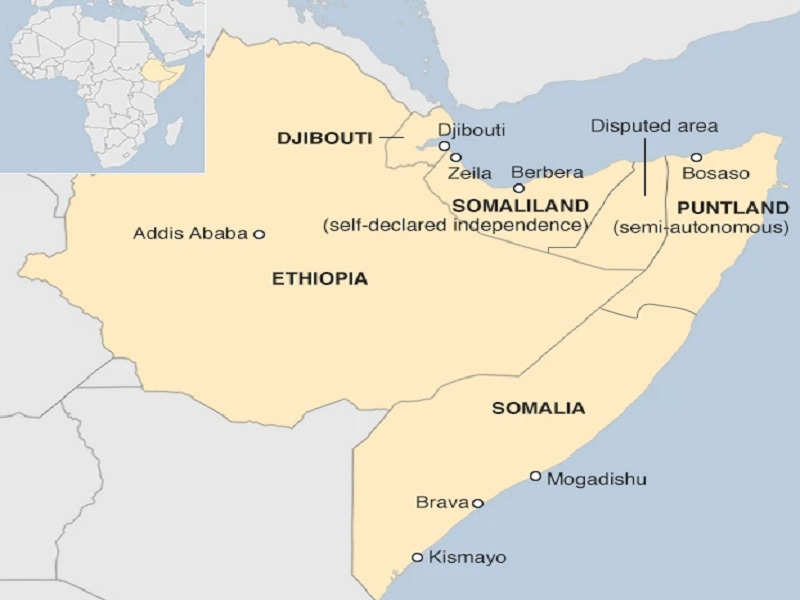All in all, Russia’s Gulf of Aden-Red Sea naval base plans depend first and foremost on whether Sudan implements their long-delayed agreement, absent which the next variable is whether the US keeps its base in Djibouti or transfers its forces from there to Somaliland upon recognizing the latter.
The Horn of Africa figured prominently on Russia’s diplomatic agenda last week after two high-profile engagements with Djibouti and Somaliland. The first concerned the National Assembly Speaker’s visit to Moscow to meet with his Russian counterpart while the second hosted a delegation led by the Chairman of the Russian Trade Association in Africa who agreed to expand agricultural, logistical, and industrial cooperation. Both developments might have a military dimension to them.
Russia has long sought to revive its Soviet-era naval presence in the Gulf of Aden-Red Sea (GARS) region, ultimately settling on building a base in Sudan, but the implementation of these plans has repeatedly been delayed due to that country’s civil war and Western pressure. That’s why Russia might be looking for alternatives in Djibouti or Somaliland in case Sudan’s latest signal of intent once again amounts to nothing. Even if things work out, however, then one of them could still host complementary facilities.
It was explained here in November 2023 “How Russia Could Mediate A Series Of Deals Between Djibouti, Ethiopia, & South Sudan”, which might result in obtaining a naval base in Djibouti in exchange for stakes in joint South Sudanese mining companies, discounted agricultural exports, and a regional oil pipeline. Djibouti might finally be interested in this if Trump implements “Project 2025’s” proposal (page 186) to recognize Somaliland “as a hedge against the US’ deteriorating position in Djibouti” vis-a-vis China.
Djibouti could prospectively replace or even likely overcompensate for its lost revenue from renting the US a naval base there if the US transfers its forces to Somaliland by taking Russia (and by extent Ethiopia and South Sudan) up on this plan. Russia could even hypothetically assume control of the US’ (by then former) Djiboutian naval base just like it assumed control of the US’ former airbase in Niger last May. A seamless transition would be in Djibouti’s immediate financial interests and lay the basis for other deals.
On the other hand, the US might stay put in Djibouti, in which case Russia would naturally prioritize Somaliland as a possible alternative to Sudan instead. Although it has cordial relations with Somalia, which lays claim to Somaliland, the Somalian President slammed Russia twice in late January 2024 while speaking at a major international conference in Italy. This context might partially explain why Russia has no qualms about offending Somalia by dispatching its trade and investment delegation to Somaliland.
Russia might be looking to lay the basis for a deal whereby formal recognition could be extended to Somaliland together with scaling their recently agreed investments in exchange for a naval base. To be clear, the aforesaid scenario is educated conjecture since no credible reports have been published at the time of writing to suggest that their representatives actually discussed this during the delegation’s visit, but it can’t be ruled out given the strategic context in which their trip took place.
All in all, Russia’s GARS naval base plans depend first and foremost on whether Sudan implements their long-delayed agreement, absent which the next variable is whether the US keeps its base in Djibouti or transfers its forces from there to Somaliland upon recognizing the latter. As can be seen, Russia is reacting to regional developments instead of trying to shape them, which its policymakers assessed to be the most pragmatic approach towards this dynamism given the limits of their country’s influence.





Thank you for so generously sharing your writings.
LF
I don't understand why Russians had chosen Sudan initially. The civil war there has been going on for a long time. Sudan has naval base values only if Russians intend to launch attacks into the surrounding regions. In contrast, bases in Djibouti and Somaliland are enough to choke the Red Sea or to perform naval escort around the Horn of Africa. The water surface is larger, the position is more suitable for shipping line control but less favorable for controlling land area (when compared to bases in Sudan). AFAIK, there is only the military dimension. Everything else is decoration.